
Funk is a music genre that originated in African-American communities in the mid-1960s when musicians created a rhythmic, danceable new form of music through a mixture of various music genres that were popular among African-Americans in the mid-20th century. It deemphasizes melody and chord progressions and focuses on a strong rhythmic groove of a bassline played by an electric bassist and a drum part played by a percussionist, often at slower tempos than other popular music. Funk typically consists of a complex percussive groove with rhythm instruments playing interlocking grooves that create a "hypnotic" and "danceable" feel. It uses the same richly colored extended chords found in bebop jazz, such as minor chords with added sevenths and elevenths, and dominant seventh chords with altered ninths and thirteenths.

Rollins Band was an American rock band formed in Van Nuys, California. The band was active from 1987 to 2006 and was led by former Black Flag vocalist Henry Rollins. They are best known for the songs "Low Self Opinion" and "Liar", which both earned heavy airplay on MTV in the early-mid 1990s.

Canned Heat is an American blues and rock band that was formed in Los Angeles in 1965. The group has been noted for its efforts to promote interest in blues music and its original artists. It was launched by two blues enthusiasts Alan Wilson and Bob Hite, who took the name from Tommy Johnson's 1928 "Canned Heat Blues", a song about an alcoholic who had desperately turned to drinking Sterno, generically called "canned heat". After appearances at the Monterey and Woodstock festivals at the end of the 1960s, the band acquired worldwide fame with a lineup of Hite (vocals), Wilson, Henry Vestine and later Harvey Mandel, Larry Taylor (bass), and Adolfo de la Parra (drums).

Jazz fusion is a popular music genre that developed in the late 1960s when musicians combined jazz harmony and improvisation with rock music, funk, and rhythm and blues. Electric guitars, amplifiers, and keyboards that were popular in rock and roll started to be used by jazz musicians, particularly those who had grown up listening to rock and roll.
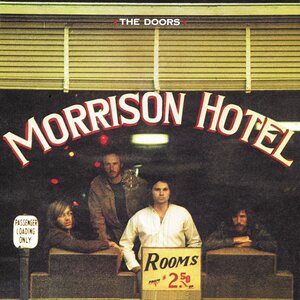
Morrison Hotel is the fifth studio album by American rock band the Doors, released on February 9, 1970, by Elektra Records. After the use of brass and string arrangements recommended by producer Paul A. Rothchild on their previous album, The Soft Parade (1969), the Doors returned to their blues rock style filled with jazz shades. This album was largely seen as a return to form for the band. The group entered Elektra Sound Recorders in Los Angeles in November 1969 to record the album which is divided into two separately titled sides, namely: "Hard Rock Café" and "Morrison Hotel". Blues rock guitar pioneer Lonnie Mack and Ray Neapolitan also contributed to the album as session bassists.
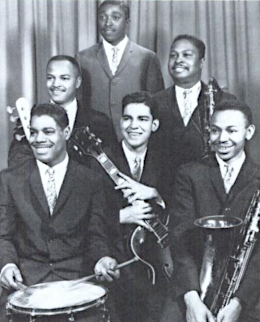
The Funk Brothers were a group of Detroit-based session musicians who performed the backing to most Motown recordings from 1959 until the company moved to Los Angeles in 1972.
Blues rock is a fusion genre and form of rock music that relies on the chords/scales and instrumental improvisation of blues. It is mostly an electric ensemble-style music with instrumentation similar to electric blues and rock. From its beginnings in the early to mid-1960s, blues rock has gone through several stylistic shifts and along the way it inspired and influenced hard rock, Southern rock, and early heavy metal.

A guitar solo is a melodic passage, instrumental section, or entire piece of music, pre-written to be played on a classical, electric, or acoustic guitar. In 20th and 21st century traditional music and popular music such as blues, swing, jazz, jazz fusion, rock and heavy metal, guitar solos often contain virtuoso techniques and varying degrees of improvisation. Guitar solos on classical guitar, which are typically written in musical notation, are also used in classical music forms such as chamber music and concertos.
Afro rock is a style of rock music with African influences. Afro rock is a dynamic interplay between Western rock music and African musical elements such as rhythm, melodies and instrumentation. Afro rock bands and artists in the late 1960s and early 1970s included Osibisa, Assagai and Lafayette Afro Rock Band.

Steve Jordan is an American musical director, producer, songwriter, and musician. Currently, he is the drummer for The Rolling Stones. During the 1970s and 1980s, he was a member of the bands for the television shows Saturday Night Live and Late Night with David Letterman.

Defunkt is an American musical group founded by the trombonist and singer Joseph Bowie in 1978 in New York City. Their music touches on elements of punk rock, funk, and jazz.

Bennie Ross "Hank" Crawford, Jr. was an American alto saxophonist, pianist, arranger and songwriter whose genres ranged from R&B, hard bop, jazz-funk, and soul jazz. Crawford was musical director for Ray Charles before embarking on a solo career releasing many well-regarded albums for labels such as Atlantic, CTI and Milestone.
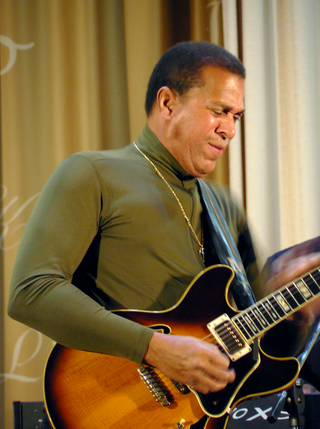
Melvin Taylor is an American electric blues guitarist, based in Chicago.
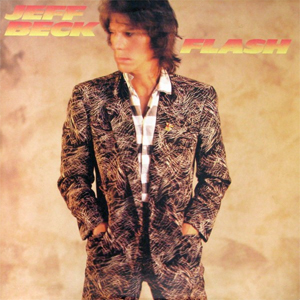
Flash is the fifth studio album by guitarist Jeff Beck, released in July 1985 by Epic/CBS Records. The album reached No. 39 on the U.S. Billboard 200 chart as well as reaching the top 60 in four other countries.
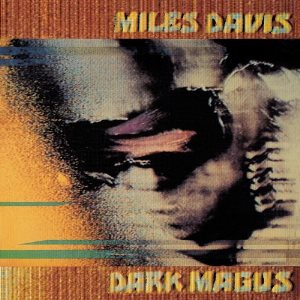
Dark Magus is a live double album by the American jazz trumpeter, composer, and bandleader Miles Davis. It was recorded on March 30, 1974, at Carnegie Hall in New York City, during the electric period in Davis' career. His group at the time included bassist Michael Henderson, drummer Al Foster, percussionist Mtume, saxophonist Dave Liebman, and guitarists Pete Cosey and Reggie Lucas; Davis used the performance to audition saxophonist Azar Lawrence and guitarist Dominique Gaumont. Dark Magus was produced by Teo Macero and featured four two-part recordings, titled with the Swahili numerals for numbers one through four.
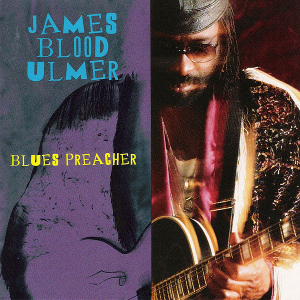
Blues Preacher is an album by the American guitarist James Blood Ulmer, recorded in 1992 and released in Japan on DIW Records and in the US on Columbia/DIW. It was released in North America in 1994.
Rock Candy Funk Party is an American jazz-funk band from Los Angeles, California. It was formed in 2009 by drummer Tal Bergman and guitarist Ron DeJesus, who had previously released Grooove, Vol. 1 in 2007. After adding guitarist Joe Bonamassa, bassist Mike Merritt and keyboardist Renato Neto, the band released its debut album We Want Groove in 2013, which reached number 5 on the US Billboard Jazz Albums chart and number 6 on the UK Jazz & Blues Albums Chart. Percussionist Daniel Sadownick joined after the album's release, featuring on the band's first live album Rock Candy Funk Party Takes New York: Live at The Iridium in 2014.
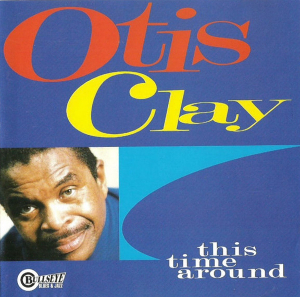
This Time Around is an album by the American musician Otis Clay, released in 1998. It was his first studio album in five years, and came about due to a desire to record in Memphis again.

Dirty Pool is an album by the American musician Melvin Taylor, released in 1997. He is credited with his Slack Band. Dirty Pool was Taylor's second album for Evidence Music.

Across the Water is an album by the American musician Bernard Allison, released in 2000. Allison supported the album with a North American tour. It was Allison's second album to be released in the United States.

















